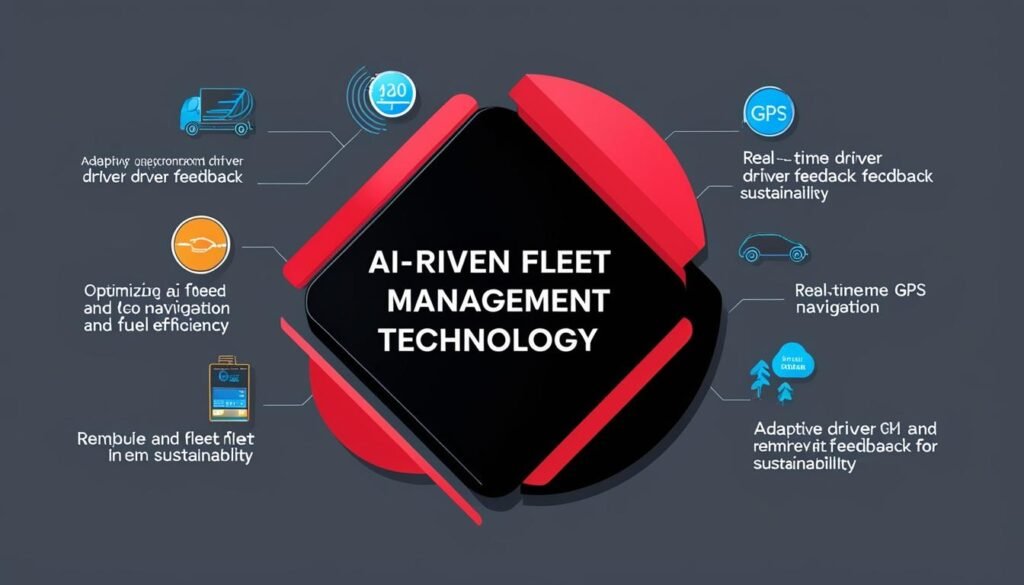Companies are leveraging AI and automation technologies to enhance fuel efficiency and reduce costs, with promising results in fleet management.
In recent developments across various sectors, businesses are increasingly incorporating artificial intelligence (AI) and automation technologies into their operations, leading to significant enhancements in efficiency and cost management. Companies focusing on fleet management, in particular, are recognising substantial benefits from these innovations, with particular emphasis on, but not limited to, fuel consumption reductions.
One key area where technology has shown promising results is the automotive sector, as highlighted by a report in the Birmingham Mail. Motorists are advised to maximise fuel efficiency by utilising the GPS technology available in modern vehicles. This technology is integrated into the central infotainment system, offering live traffic updates that help drivers navigate routes with minimal disruptions. Experts suggest that minimising time spent idling in stationary vehicles can lead to considerable savings on fuel, especially for those filling up at major retailers such as Tesco, Morrisons, and Sainsbury’s.
To further support this effort, Bristol Street Motors articulates the importance of using GPS systems that provide not just location data but also real-time insights into traffic conditions and vehicle status. For businesses with fleets, implementing advanced tracking solutions such as the GT06N 4G can play a crucial role in optimising routes, improving driver behaviour, and maintaining vehicles efficiently. The system detects driver habits that contribute to excessive fuel consumption, such as speeding and prolonged idling, while sending real-time alerts to fleet managers to implement corrective actions.
In a more extensive case study, Van Fleet World reports on Currys, a prominent retail company, which has successfully utilised Lightfoot’s in-cab driver coaching technology and rewards platform across its fleet of 262 Ford Transits and 410 Iveco Dailys. Their implementation of this technology has yielded remarkable results, including more than £400,000 in saved fuel expenditures annually, translating to almost £620 saved for each vehicle over the year. The technology has resulted in a 10.8% improvement in miles per gallon (MPG) and a significant reduction in both CO2 emissions and idling times.
Having adopted the Lightfoot system in 2016, Currys has benefitted from advancements in driver feedback mechanisms that have led to substantial reductions in aggressive driving practices. The results over the past several years show a 15.8% decrease in blameworthy accidents, a development the retailer shares with its insurance partners. The data collected through Lightfoot not only assists in improving safety but also plays a pivotal role in Currys’ Environmental and Social Governance (ESG) assessments.
Chris Georgiou, head of compliance for supply chain and service operations at Currys, stated, “From the early days of working with Lightfoot, we recognised the huge benefit that real-time driver feedback has to play in changing driving styles for the better.” This technology also encourages a competitive spirit among drivers, with engagement strategies such as prize draws for elite drivers that contribute to their motivation to drive more safely and efficiently.
Lightfoot’s managing director, Paul Hollick, noted Currys’ commitment to transitioning towards a low-carbon fleet, aiming to convert 100% of its small van fleet and 50% of its medium to heavy fleet to electric or alternative fuel by 2030. This ambitious initiative is indicative of a broader trend, with businesses across various industries leveraging AI and automation to not only drive operational efficiencies but also contribute to sustainability efforts.
With such advancements taking place in the sector, it becomes increasingly clear that the integration of AI automation is shaping the future of transportation, offering numerous potential benefits for both the environment and business operations.
Source: Noah Wire Services
- https://www.frotcom.com/blog/2024/07/how-does-artificial-intelligence-transform-fleet-management – This article explains how AI optimizes fuel consumption, reduces idle time, and enhances maintenance planning in fleet management, supporting the claims of fuel efficiency and cost reduction.
- https://www.tchek.ai/blog/the-ai-advantage-transforming-fleet-management-for-better-roi – This blog post discusses how AI in fleet management reduces restoration costs, optimizes decision-making, and enhances traceability and vehicle monitoring, aligning with the benefits of cost savings and efficient operations.
- https://www.leewayhertz.com/ai-in-fleet-management/ – This article details how AI in fleet management forecasts maintenance requirements, optimizes routes, and improves driver safety, corroborating the use of GPS and real-time insights for efficiency and safety.
- https://www.frotcom.com/blog/2024/07/how-does-artificial-intelligence-transform-fleet-management – This source highlights the role of AI in route optimization, considering traffic and weather conditions, which supports the importance of real-time traffic updates and vehicle status monitoring.
- https://www.tchek.ai/blog/the-ai-advantage-transforming-fleet-management-for-better-roi – This article mentions the use of AI for proactive inspections and maintenance, reducing downtime and repair costs, which aligns with the benefits seen in companies like Currys.
- https://www.leewayhertz.com/ai-in-fleet-management/ – This source explains how AI facilitates dynamic route optimization and tracks driver patterns, supporting the reduction in aggressive driving practices and improvements in safety and efficiency.
- https://www.frotcom.com/blog/2024/07/how-does-artificial-intelligence-transform-fleet-management – This article discusses the future of fleet management with AI, including the development of autonomous vehicles and enhanced driver assistance technologies, which aligns with the trend towards low-carbon fleets and sustainability efforts.
- https://www.tchek.ai/blog/the-ai-advantage-transforming-fleet-management-for-better-roi – This blog post emphasizes the immediate and measurable financial gains from AI solutions, such as cost savings in vehicle restoration and improved operational efficiency.
- https://www.leewayhertz.com/ai-in-fleet-management/ – This article highlights the ease of use and accessibility of AI solutions for fleet managers, which supports the adoption of technologies like Lightfoot’s in-cab driver coaching system.
- https://www.frotcom.com/blog/2024/07/how-does-artificial-intelligence-transform-fleet-management – This source addresses concerns about data security and privacy with AI, ensuring that sensitive information is protected, which is crucial for businesses integrating AI into their fleet management systems.
- https://www.tchek.ai/blog/the-ai-advantage-transforming-fleet-management-for-better-roi – This article underscores the role of AI in enhancing decision-making processes for fleet managers, including claims, repairs, and direct handling, which aligns with the operational efficiencies observed in companies like Currys.
- https://www.birminghammail.co.uk/motoring/motoring-news/tesco-morrisons-sainsburys-asda-drivers-30728847 – Please view link – unable to able to access data
















